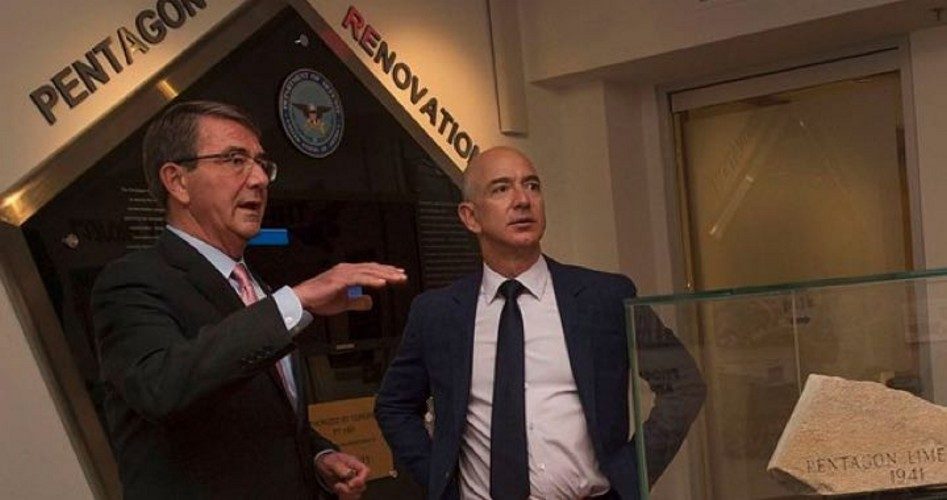
Amazon CEO Jeff Bezos (right) is at war with the National Enquirer, which he claims tried to blackmail him with intimate text messages and photos that Bezos and his mistress exchanged by iPhone — a serious invasion of privacy, not to mention cause for concern as to how The Enquirer came to possess these communications.
Bezos and others suspect that Bezos was targeted by The Enquirer because David Pecker, the chairman of the tabloid’s parent company, is an ardent (and then some) supporter of President Donald Trump, while Bezos, particularly through his ownership of the Washington Post, is perceived as a Trump foe. They also suspect that the Trump administration provided the embarrassing communications to The Enquirer, having obtained them from federal surveillance databases. It’s certainly possible, given the government’s sordid history of blackmailing political enemies with damaging information about their sex lives, but as yet there is no evidence to substantiate these suspicions.
Still, “if Bezos were the political victim of surveillance state abuses, it would be scandalous and dangerous. It would also be deeply ironic,” observed the Intercept’s Glenn Greenwald.
That’s because Amazon, the company that has made Bezos the planet’s richest human being, is a critical partner for the U.S. Government in building an ever-more invasive, militarized and sprawling surveillance state. Indeed, one of the largest components of Amazon’s business, and thus one of the most important sources of Bezos’ vast wealth and power, is working with the Pentagon and the NSA to empower the U.S. Government with more potent and more sophisticated weapons, including surveillance weapons.
For example, in 2017 Amazon announced that it had improved its face-recognition software, Rekognition, to the point that it could “detect, analyze, and index up to 100 faces … in a single image,” allowing users to “accurately capture demographics and analyze sentiments for all faces in group photos, crowded events, and public places such as airports and department stores.” The company said that many of its Rekognition customers are government agencies and police departments.
“With Rekognition, a government can now build a system to automate the identification and tracking of anyone,” warned the American Civil Liberties Union (ACLU). The group suggested that by using the software, police body cameras “would further transform into surveillance machines aimed at the public” and “cities might routinely track their own residents, whether they have reason to suspect criminal activity or not.”
Amazon has also deployed an app that lets police broadcast various notifications to Amazon Echo owners, and the app was expected to be upgraded to allow users to report crimes through their Echoes. Crime reports are stored on Amazon servers, raising privacy concerns.
Amazon’s Ring cameras, supposedly designed for home-security purposes, also present privacy issues. “Ring has a history of lax, sloppy oversight when it comes to deciding who has access to some of the most precious, intimate data belonging to any person: a live, high-definition feed from around — and perhaps inside — their house,” reported The Intercept’s Sam Biddle.
The ACLU cautioned:
Imagine if a neighborhood was set up with these doorbell cameras. Simply walking up to a friend’s house could result in your face, your fingerprint, or your voice being flagged as “suspicious” and delivered to a government database without your knowledge or consent. With Amazon selling the devices, operating the servers, and pushing the technology on law enforcement, the company is building all the pieces of a surveillance network, reaching from the government all the way to our front doors.
Bezos’ companies have also been the recipients of major national-security-state contracts. In 2014, Amazon got $600 million from the Central Intelligence Agency (CIA) for cloud-computing software. Last year, Bezos’ aerospace company, Blue Origin, signed a $500-million deal with the Air Force “to help develop military rockets and spy satellites,” noted Greenwald. And Amazon is currently in the running for a $10-billion contract to provide cloud services to the Defense Department.
In short, wrote Greenwald, “one of the world’s greatest privacy invaders just had his privacy invaded.” Bezos is right to protest the invasion of his privacy. With any luck, he’ll recognize that his companies are engaged in the same nefarious activities and put a stop to them.
Photo of Jeff Bezos: Department of Defense



